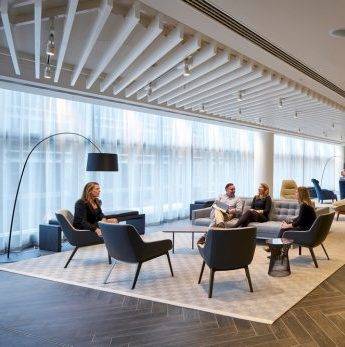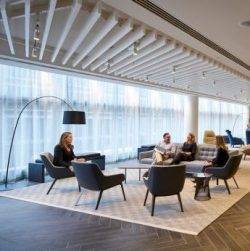June 14, 2018
Nearly half of employees still assigned to same place as the traditional office clings on

The worry over a loss in productivity when people are able to work anywhere is entirely unfounded, and what we once called “alternative”, we have come to call current and future workplace strategies, a new report claims. Yet the new study, ‘The Once Alternative Workplace Strategies’, which was conducted and released by Advanced Workplace Associates (AWA), Global Workplace Analytics and Haworth Inc, found that nearly half of employees are still permanently assigned to one space; with no change since 2008. The research pinpoints five leading trends within today’s workplaces and compares the findings to the initial research from more than a decade ago. (more…)











 Organisations with a strong people analytics culture are much more likely to report strong business performance claims new global research from the CIPD in association with Workday. However, the survey also highlights that the wide scale adoption of people analytics practice is still low and that more needs to be done to improve skills and confidence in the HR function, particularly in the UK which is lagging behind other markets in both capability and confidence. The research also highlights the importance of access to data. It found that access to people data improves outcomes but only 71 percent of HR professionals have access to this data, and just 42 percent of finance professionals do. For those with access to people data, just 22 percent use it daily in their decision-making and almost a quarter (23 percent) use it in decision-making just once a month or less. The research, People Analytics: driving business performance with people data, surveyed 3,852 business professionals globally – including HR and finance professionals – to understand attitudes towards people analytics and how it is being used in organisations.
Organisations with a strong people analytics culture are much more likely to report strong business performance claims new global research from the CIPD in association with Workday. However, the survey also highlights that the wide scale adoption of people analytics practice is still low and that more needs to be done to improve skills and confidence in the HR function, particularly in the UK which is lagging behind other markets in both capability and confidence. The research also highlights the importance of access to data. It found that access to people data improves outcomes but only 71 percent of HR professionals have access to this data, and just 42 percent of finance professionals do. For those with access to people data, just 22 percent use it daily in their decision-making and almost a quarter (23 percent) use it in decision-making just once a month or less. The research, People Analytics: driving business performance with people data, surveyed 3,852 business professionals globally – including HR and finance professionals – to understand attitudes towards people analytics and how it is being used in organisations.
 Almost half (49 percent) of companies are struggling to find skilled workers as digitisation and automation cause significant change in the skills businesses look for in professionals, according to new data from Robert Half UK. As a result, one fifth (21 percent) are now looking to recruit candidates with exceptional soft skills, with a view to developing the desired technical skills on the job. In the Robert Half research, UK business leaders consider an openness to new ideas (28 percent), an openness to change (26 percent) and good communication abilities (19 percent) as key attributes and will prioritise these areas when considering new talent. Digitisation and automation are rapidly evolving the business world. Companies are having to quickly adapt to the changing world of work, and are looking for employees who can keep pace,” says Matt Weston, UK Managing Director at Robert Half.
Almost half (49 percent) of companies are struggling to find skilled workers as digitisation and automation cause significant change in the skills businesses look for in professionals, according to new data from Robert Half UK. As a result, one fifth (21 percent) are now looking to recruit candidates with exceptional soft skills, with a view to developing the desired technical skills on the job. In the Robert Half research, UK business leaders consider an openness to new ideas (28 percent), an openness to change (26 percent) and good communication abilities (19 percent) as key attributes and will prioritise these areas when considering new talent. Digitisation and automation are rapidly evolving the business world. Companies are having to quickly adapt to the changing world of work, and are looking for employees who can keep pace,” says Matt Weston, UK Managing Director at Robert Half.




 A major research study “
A major research study “
 Business Secretary Greg Clark proposed new laws in Parliament yesterday (June 11th) that new large firms will have to justify their chief executives’ salaries and reveal the gap to their average UK worker. It means that for the first time, UK listed companies with more than 250 UK employees will have to disclose and explain this difference – known as ‘pay ratios’ – every year. However, according to data published today by the Chartered Management Institute (CMI) and
Business Secretary Greg Clark proposed new laws in Parliament yesterday (June 11th) that new large firms will have to justify their chief executives’ salaries and reveal the gap to their average UK worker. It means that for the first time, UK listed companies with more than 250 UK employees will have to disclose and explain this difference – known as ‘pay ratios’ – every year. However, according to data published today by the Chartered Management Institute (CMI) and 














June 13, 2018
US companies are waking up to the benefits of caring for employee mental health
by Colleen O'Day • Comment, Wellbeing
(more…)